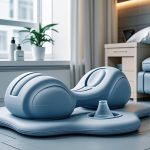The sensation can be startling – you’re comfortably seated cross-legged, perhaps working, reading, or simply relaxing, when suddenly a strong urge to urinate arises. It’s not necessarily accompanied by pain, but it’s urgent, demanding attention and often prompting a quick dash to the restroom. Many people experience this occasionally, dismissing it as an anomaly, but for some, it becomes frequent enough to cause concern or disrupt daily life. Understanding why this happens requires looking at the interplay between posture, pelvic floor function, bladder control, and even psychological factors. It’s rarely indicative of a serious medical problem, but recognizing potential contributing factors is key to managing it effectively and ensuring peace of mind.
This phenomenon isn’t necessarily about creating urine; rather, it’s often about the perception of needing to urinate being amplified by the position itself. The cross-legged posture can place pressure on the bladder and pelvic region, but it doesn’t usually generate new urine. Instead, it can heighten awareness of a normally full bladder or trigger a false alarm in the nervous system regarding bladder fullness. This article will explore the potential causes behind this sudden urge while seated cross-legged, how to differentiate between normal occurrences and situations warranting further investigation, and strategies for mitigating the discomfort and anxiety it can cause. It’s about understanding your body and taking proactive steps towards comfort and well-being.
Posture and Pelvic Pressure
The most immediate explanation for a sudden urge while cross-legged is related to the position itself. Sitting in this manner inherently compresses the pelvic region, which houses vital organs including the bladder, uterus (in individuals with a uterus), and rectum. – This compression isn’t harmful in most cases, but it can directly impact how your bladder perceives fullness. When you sit cross-legged, you’re essentially applying external pressure to the bladder, reducing its capacity slightly and potentially stimulating the urge to void even if it’s not truly full. The degree of pressure varies based on individual anatomy, body weight, and how tightly legs are crossed.
Furthermore, the posture can influence pelvic floor muscle function. These muscles play a critical role in supporting the bladder and urethra, contributing significantly to urinary control. When compressed or put under strain, they may not function as effectively, leading to a diminished ability to inhibit urination signals. Think of it like a support system; if that support weakens even temporarily, the structure it’s holding up—in this case, your bladder—might feel less secure and trigger an urge. It’s important to note that prolonged or habitually tight crossing of legs can contribute to muscle imbalances over time.
This doesn’t mean avoiding cross-legged sitting altogether! For many people, it’s a comfortable and natural position. However, being aware of its potential impact on bladder perception is crucial for understanding the sudden urges experienced when adopting this posture. It helps differentiate between a normal physiological response to pressure and something potentially more concerning. Recognizing that posture plays a significant role can already alleviate anxiety surrounding these episodes.
The Role of the Pelvic Floor
The pelvic floor isn’t just about urinary control; it’s an intricate network of muscles, ligaments, and nerves responsible for supporting multiple bodily functions. A healthy and strong pelvic floor is essential for maintaining continence – the ability to hold urine without leakage. Weakened or dysfunctional pelvic floor muscles can contribute to a heightened sensitivity to bladder fullness, making individuals more prone to sudden urges. – Factors like pregnancy, childbirth, aging, chronic constipation, and even prolonged sitting can all impact pelvic floor strength.
The connection between cross-legged sitting and the pelvic floor is twofold. First, as mentioned earlier, the posture itself can put strain on these muscles. Second, if your pelvic floor is already weakened or compromised, the added pressure from sitting may exacerbate the issue. This can lead to a feeling of urgency even when the bladder isn’t particularly full. – Strengthening exercises like Kegels (discussed below) can help improve pelvic floor muscle tone and stability, potentially reducing the frequency and intensity of these urges.
It is important to remember that overdoing pelvic floor exercises can also be detrimental. Just like any other muscle group, they need a balance between strengthening and relaxation. Hyperactive pelvic floor muscles can contribute to discomfort and even urinary issues. A qualified healthcare professional (like a physical therapist specializing in pelvic health) can provide personalized guidance on appropriate exercise routines.
Bladder Habits & Sensitivity
Our daily habits significantly influence bladder function and sensitivity. Frequent consumption of diuretics – substances that increase urine production, such as caffeine, alcohol, and certain medications – can contribute to a more active bladder. While these aren’t inherently bad, they can make you more aware of your bladder’s fullness, potentially amplifying the urge when sitting cross-legged. Similarly, habitually holding your urine for extended periods can stretch the bladder over time, reducing its capacity and increasing sensitivity.
The concept of “bladder training” is often recommended by healthcare professionals to help regulate bladder habits. This involves gradually increasing the intervals between urination attempts, even if you don’t feel a strong urge. – The goal isn’t to hold your urine indefinitely, but rather to retrain your bladder to function more efficiently and reduce its hypersensitivity. It’s about establishing a healthier relationship with your bladder and minimizing unnecessary urgency.
Furthermore, psychological factors can play a role. Anxiety or stress can heighten awareness of bodily sensations, including the feeling of needing to urinate. If you’re already prone to worrying about urinary control, sitting cross-legged might trigger heightened anxiety, leading to a perceived increase in urgency. – Mindfulness techniques and stress management strategies can be helpful in managing these psychological components.
Differentiating Normal from Concerning Urgency
It’s crucial to distinguish between occasional urges triggered by posture and symptoms that may indicate an underlying medical condition. While the sensation while cross-legged is usually benign, certain red flags should prompt a visit to a healthcare professional. – These include:
1. Frequent urination even when not sitting cross-legged.
2. Painful urination or blood in the urine.
3. Incontinence – involuntary leakage of urine.
4. A sudden and dramatic change in urinary habits.
5. Feeling like you can’t empty your bladder completely.
These symptoms could indicate a urinary tract infection (UTI), an overactive bladder, interstitial cystitis (a chronic bladder condition), or other medical issues requiring diagnosis and treatment. Self-diagnosis is never recommended. A healthcare provider can perform necessary tests to determine the cause of your symptoms and recommend appropriate interventions. It’s always better to be proactive when it comes to health concerns.
Ultimately, understanding the connection between posture, pelvic floor function, bladder habits, and psychological factors provides a comprehensive perspective on this common experience. By incorporating strategies like strengthening pelvic floor muscles, practicing mindful bladder habits, and managing stress levels, individuals can often mitigate these urges and enjoy greater comfort and control.





















